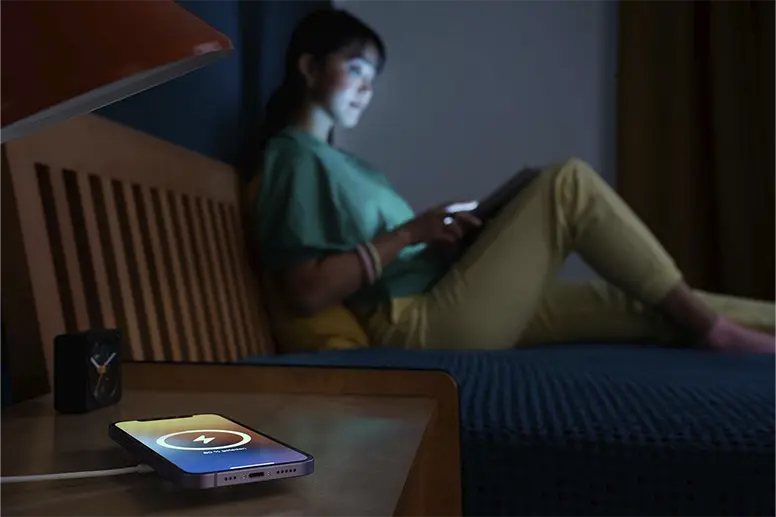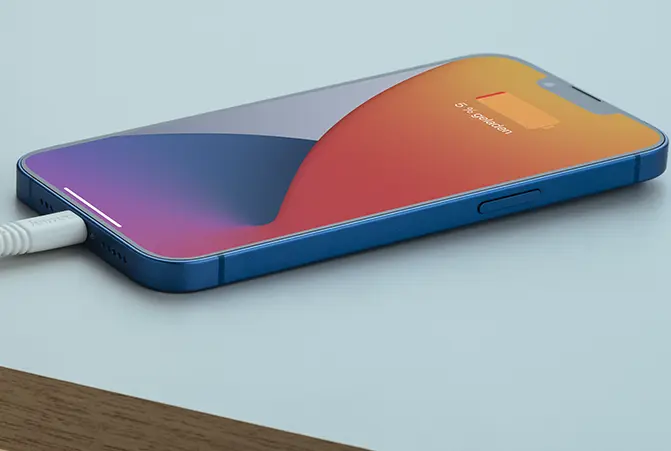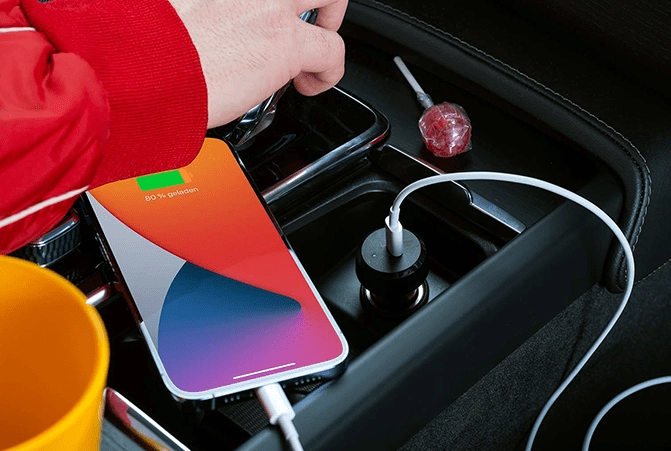Charging a phone overnight
Is it harmful or even dangerous to charge a mobile phone overnight? We’ll show what you need to bear in mind if you charge your mobile phone at night.
9 min read | Nov 17, 2021
At a glance: Charging a phone overnight
- Charging modern mobile phones overnight no longer poses a safety risk today
- However, without activated protection mechanisms, the rechargeable battery can be subject to greater wear
- Activate mobile phone settings to protect the rechargeable battery
- Mobile phone power adapters, Mobile phone charging cables and regularly check the smartphone connection, replacing it if necessary
- Switch the mobile phone off at night to protect it as it charges
-
Does it break your rechargeable battery if you charge it for too long?
No, the rechargeable battery is not broken if you charge it for too long. However, it ages more quickly and its lifespan is thus reduced. Ideally, disconnect the device from the charger once the rechargeable battery is charged up. You can read more about this in our article How to charge a phone battery properly.
-
Why shouldn’t you charge a mobile phone to 100%?
You shouldn’t charge a mobile phone to 100% because the rechargeable battery can suffer as a result. The ideal range for Li-ion rechargeable batteries is between 20 and 80 per cent. If a phone battery is permanently connected to the charger, this speeds up the chemical ageing of the battery cells and the rechargeable battery quickly loses power.
-
Is it dangerous to charge your mobile phone overnight?
No, nowadays, it’s no longer dangerous to charge your mobile phone overnight. Modern smartphones have intelligent technologies that protect the rechargeable battery from overheating and serious damage. However, being connected to a charger for too long can have a negative impact on the lifespan of the rechargeable battery.
Charging a phone at night: Generally a good idea?
When you go to bed, you set your alarm, connect your phone to charge overnight and then enjoy a restful sleep yourself. What sounds practical can, however, put great strain on your smartphone’s rechargeable battery. In contrast to human sleep, it only takes a short time for the battery cells of modern mobile phones to be recharged and ready for the day ahead. If you want to charge a phone battery properly, avoid having your phone connected to a charger for too long.
If your mobile phone is permanently connected to a charger, this can have a negative impact. Although it is no longer possible to overcharge a modern rechargeable battery, both the battery life and the lifespan of the rechargeable battery are impaired. This is why modern mobile phones and iPhones are equipped with charging protection to prevent anything worse from happening. Nevertheless, despite this kind of overcharge protection, the ageing of the battery cells in a mobile phone can still be accelerated.

Safety: Can you charge a mobile phone by the bed at night without any worries?
The permanent power supply no longer poses a safety risk for modern smartphones thanks to overcharge protection. If you charge your mobile phone overnight, there is thus also no danger of a fire due to overheating. Even severe damage to the rechargeable battery cells due to the prolonged connection to a charger is now a thing of the past.
This is due to work by hardware and software manufacturers, who use sophisticated technologies to ensure that a phone battery is well protected, despite any supposed incorrect handling.
These are almost identical for all common smartphone manufacturers. As a result, your choice of mobile phone has no bearing on rechargeable battery safety. Only the software features for gentle charging differ. If, for instance, you sometimes want to charge an iPhone overnight, the charging process to charge the iPhone intelligently is controlled differently compared to smartphones from other manufacturers.
Tip: To ensure that you are charging your mobile phone safely overnight, regularly check that the Mobile phone power adapterspower supply unit, Mobile phone charging cables charging cable and the charging connection on the smartphone are in a fault-free condition and replace the components if necessary.
Ideal products for charging overnight
Is charging at night harmful for the rechargeable battery?
Although there is no acute safety risk if you charge your phone battery overnight, the long period of time connected to a charger can sometimes place a great strain on the battery cells and, as already indicated, impair both battery life and the lifespan of the rechargeable battery. The consequence: Without corresponding battery protection mechanisms, the ageing process is accelerated and the phone battery is drained more quickly.
It is irrelevant here whether you charge your phone without a cable or connect the charging cable directly to the smartphone, as the permanent power supply itself puts a strain on the rechargeable battery cells. This is why charging a mobile phone overnight can damage the rechargeable battery. However, there are ways to gently charge your phone battery overnight. Exactly what you can do depends on your smartphone.

Mobile phone settings: Charging Samsung, iPhone and the like correctly overnight
The following applies to all models: If you want to charge your phone battery overnight, ideally switch the smartphone off. This allows the rechargeable battery to be charged particularly evenly without consuming energy. If you switch your mobile phone off overnight, this can even ensure that it operates more smoothly as all of the apps are closed and unnecessary files are deleted. We have put together a list of further settings for you below according to brand.
-
Charging an iPhone overnight
To optimally charge your iPhone overnight, use the “Optimised Battery Charging” function. This feature has been available since iOS 13 and automatically learns how you charge and use your iPhone. If you often charge your iPhone overnight at home, it is initially only charged to a maximum of 80 per cent and remains at this level for most of the night. The rechargeable battery is only charged fully shortly before you get up to protect the battery cells.
-
Charging a Samsung at night
Samsung also offers a function to optimally charge the phone battery overnight in selected models. This can be found under Settings > Device Care > Battery and is called “Protect Battery". On compatible models, the feature can be activated using the slide control. The smartphone then defines 85 per cent of the battery capacity as a 100-per-cent charge and does not charge it any further. A 100-per-cent battery charge also appears on the display, although the physical energy store is only 85 per cent charged.
-
Charging a Huawei overnight
Huawei uses a similar method to Apple and only charges the phone battery up to a maximum of 80 per cent overnight. Depending on usage behaviour or if an alarm clock has been set, the remaining 20 per cent flow into the rechargeable battery in time for you to get up. The function is called "Smart Charge" and can be found under Settings > Battery > More battery settings.
-
Charging a Sony gently at night
On Sony smartphones, you can, among other things, decide for yourself what the maximum charge of the rechargeable battery should be. This allows you to stop the energy supply at 80 or 90 per cent, for instance. The mobile phone also learns how long you usually charge it for and adapts the charging process accordingly so that it is only charged fully when you disconnect it from the mains supply. Sony calls this function “Battery Care” and it is also located in the rechargeable battery settings.
More tips
A full battery in the morning without charging the mobile phone overnight? That’s also possible and even protects the smartphone and battery cells. Our recommendation: Charge your mobile phone properly in the evening before you go to sleep. Then disconnect it from the charger and switch it off. This way, you will optimally protect the rechargeable battery and maximise its life.
If there are no factory settings to charge your phone battery gently overnight, you can use various third-party apps on Android smartphones. This gives you more control over your phone battery and you can even set your own charging limits, among other things. However, you do so at your own risk. So, you should only use helpful tools like this if you really know what you are doing and what charging settings are ideal for your model.
Actively eliminate any problems. If, for example, your mobile phone charges slowly, investigate the causes instead of placing a strain on the rechargeable battery by charging it for a long time overnight. Faulty cables or power supply units, soiled connections or energy-hungry apps can generally be identified quickly and the charging problems that they create are then easy to resolve.







